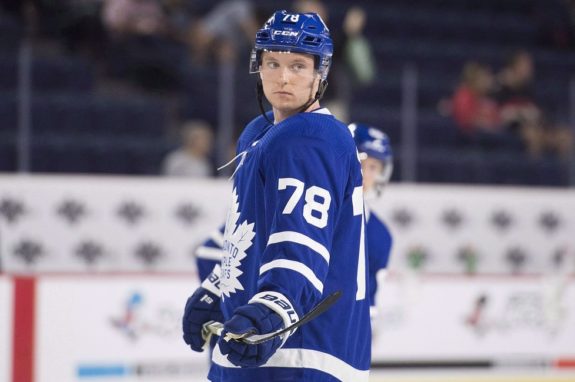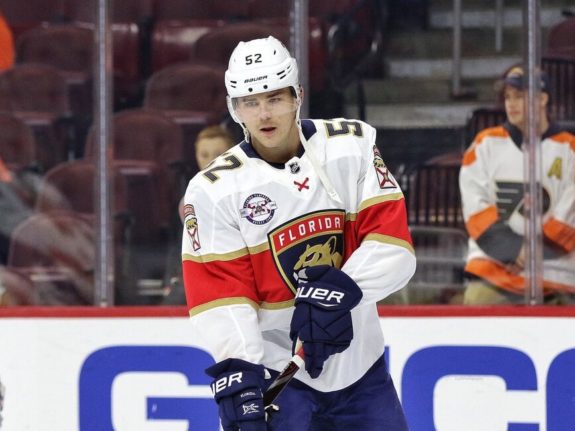In this edition of Toronto Maple Leafs News & Rumors, I’ll report three issues the NHL faces before it can even begin 2020-21 regular-season play. These issues include the potential impact of the presidential election in the United States on any decisions about when the NHL might start any regular season play.
Related: Maple Leafs Radical Trade Rumors: Nylander, Ekblad, Nurse & Subban
As well, earlier today an issue emerged about the confusion about the Return-to-Play Memorandum of Agreement (MoU) the NHL and the NHLPA (Players Association) signed before the 2019-20 postseason could commence. Finally, I’ll share a possible solution about what to do with minor league hockey teams – specifically AHL teams – that are affiliated with NHL clubs.
Item One: Setting an NHL 2020-21 Regular-Season Start Date
About five days ago, the NHL announced that the 2020-21 season was being planned and, if possible, would begin on Jan. 1 2021 (or so). However, given the ravages of the coronavirus (COVID-19) those plans might be up in the air. Still, this announcement outlined the NHL’s plan to schedule a full 82-game regular season.
However, during a conference call last Friday, both NHL Commissioner Gary Bettman and Deputy Commissioner Bill Daly suggested that such an early start date or even an entire season might not be possible given unknowns about the pandemic. However, fans should probably know that discussions are beginning but there’s still a lot up-in-the-air.

Personally, as I assess the situation, I’m surprised NHL groups are announcing they are talking currently – by currently, I mean “this week.” It seems to me that the most important event that impacts upcoming NHL decisions about hockey next season is the presidential election in the United States. Depending upon the outcome of that election, different considerations must be made.
I know that my posts are not about politics; but, certainly, the political situation impacts the COVID-19 pandemic, and the COVID-19 pandemic is the single issue that impacts the upcoming NHL’s decisions. In the United States, on one hand, the current president dismisses COVID-19 as an issue and suggests the US is “rounding the corner,” all while the nation sets record numbers for infected people each day.
Related: Worst Toronto Maple Leafs Trades
On the other hand, if the opposing candidate were elected the outcome would create a radically different COVID-19 response. It would likely mean things would tighten up before they opened up and would begin a more aggressive attack on slowing the rate of infection.
Either way, these political choices must impact NHL decisions about what a 2020-21 season looks like. I note that, regardless of the political situation, it’s wise to keep talking.
Still, context is hugely important in future NHL decisions. I can’t imagine any final hockey decision being made without knowing the impact of the US election. I also believe such considerations have already been part of NHL conversations at the highest levels and the negotiations between the NHLPA and the NHL’s league office.
Just yesterday, Darren Dreger tweeted a rumor that might impact those considerations.
In short, as I noted, for fans the point is that considerations about starting a 2020-21 regular season are being discussed. Fans should be hearing more about this in the next while, perhaps in the next few weeks.
Item Two: Is there Trouble in Hockey Land About Players’ 2020-21 Salaries?
The National Hockey League is like any other business. When things are good, they can be very good. When things are bad, they can be very bad. COVID-19 has created a situation where things are bad.
There’s no other way to say it. The NHL is currently not profitable. Perhaps this mode is short-term; however, what’s happened with COVID-19 will impact the NHL for years into the future. Right now, the situation is different than it was a year ago. Today, rather than profit sharing, both the NHLPA and the NHL owners are debt-sharing.
Now it seems there’s a disagreement brewing about players’ salaries for the 2020-21 season. An article today reported the news that the Players Association and the NHL owners and league office might have had different interpretations of the Return-to-Play Memorandum of Understanding signed by both the NHL and the NHLPA in July.
The MoU was written as a list of edits to the current Collective Bargaining Agreement. It wasn’t a new CBA document. It’s basic purpose at the time was to create and agree upon rules for a Return-to-Play format.
Related: 10 Reasons Hockey Is the Greatest Sport on Earth
One issue in question was whether the NHL could pro-rate players’ salaries if the number of games actually played in the 2020-21 regular season totaled fewer than the 82-game schedule that’s been in place since 1995. TVA broke a story last night that trouble could be brewing between the NHL and the NHLPA.
Specifically, it was announced today that “Antoine Roussel was interviewed by TVA Sports Jean-Charles Lajoie and Roussel noted that the NHL had plans to pro-rate players’ pay by the number of games scheduled for the season and that players ‘did not sign that.’”

Roussel noted that NHL players didn’t agree to pro-rate salaries and pointed to the section of the MoU where they agreed to accept a salary at no less than 72 percent of the pay stated in their contract after escrow and deferral deductions. Doing the math, it’s simple to see players’ concerns. Should the NHL cut the number of scheduled games – for example by a third – and then pro-rate that deduction on top of players’ accrued escrow and deferral deductions, players’ pay would fall way under that 72 percent line.
On the other hand, all players’ contracts contain a clause that “seems to allow” the NHL to prorate salaries and, specifically, the MoU didn’t “explicitly” delete such a clause or temporarily suspend it. This means that lawyers could be involved before a new season gets underway if plans include a shortened season.
This secondary issue will be part of any negotiations or conversations about starting a 2020-21 regular season. Sadly, nothing seems easy in a time of COVID-19.
Item Three: Might There Be a Toronto Maple Leafs Lite?
During a recent episode of Steve Dangle’s Podcast, Chris Johnston shared a bit of news that might impact the Maple Leafs’ AHL affiliate the Toronto Marlies. In the podcast, Johnston hinted there might be negotiations about AHL play assuming a very different format. Specifically, Johnston noted the chance that the Marlies might travel with the Maple Leafs and play opening games with their opponent for that evening?
Specifically, Johnston mentioned a rumor “floating around” that suggests dividing each NHL team into two groups – an A-team and a B-team. In the case of the Maple Leafs, that A-team would be the NHL club and the B-team would be the AHL club.

Both teams would travel together following the A-team’s schedule. The B-team would then play the opponent’s B-team and the A-teams (the NHL teams) would play each other. For example, if the Maple Leafs were playing the Ottawa Senators, the A-team Maple Leafs would play the A-team Senators; however, the B-team (Marlies) would play the B-team Senators (the Belleville Senators) the same day.
It’s an interesting idea; and, should that be the case it would offer all the teams to share facilities, travel, and be able to call waiver-exempt players back and forth between each team to comply with salary-cap regulations. It would be a huge advantage for the Maple Leafs, who seem to be speed-dating the upper limits of the salary cap almost weekly. For the more-easily salary-cap compliant Senators, it would be less of an advantage.
It would also help younger players. For example, a player who wouldn’t have played in the A-team’s roster could play that day on the B-team’s roster. It’s really an interesting short-term proposal.
What’s Next for the Maple Leafs?
There seem to be a large number of restricted free agents without new contracts for next season. Might this be a chance for Maple Leafs general manager Kyle Dubas to capitalize on a tough situation between a player and a team? He’s been the victim of such situations himself.
Related: Revisiting the Nazem Kadri Trade
If that were the case, the team forward unit seems quite deep. But there might be a chance to find an inexpensive defenseman – I’m thinking like a MacKenzie Weegar (whose name has been mentioned a couple of times in rumors) or Vince Dunn. Could such a player be signed to a team-friendly contract?

If the Maple Leafs ran a short roster (20 players), there might be enough salary-cap space for such a move. Really, who knows what Dubas might have up his sleeve?